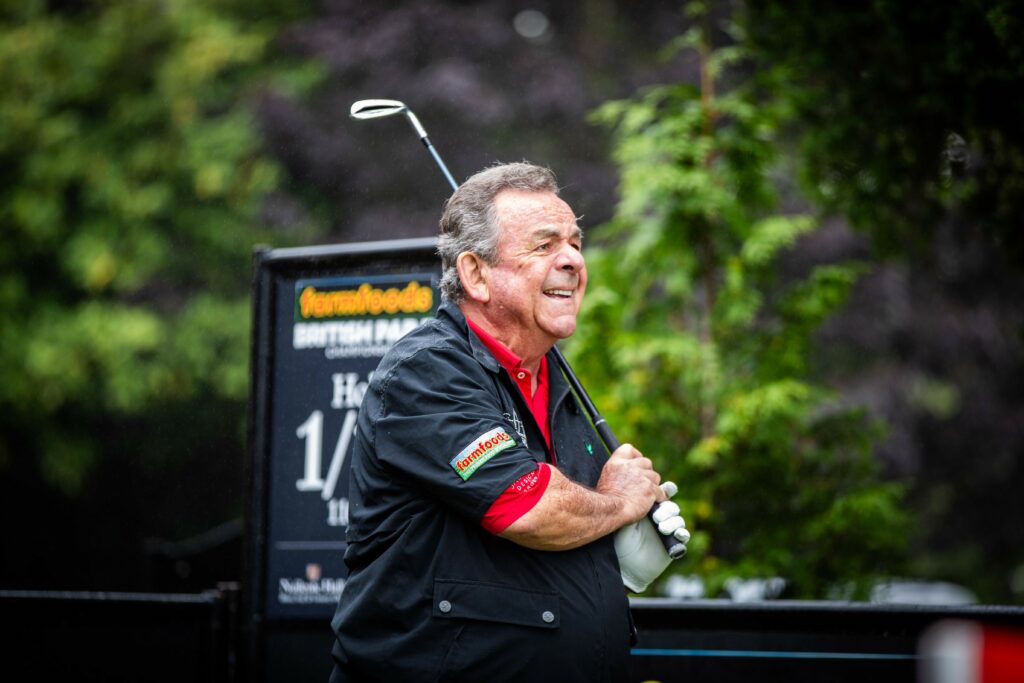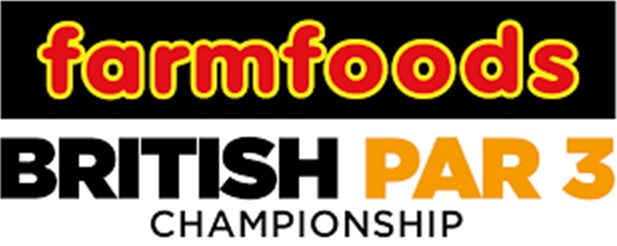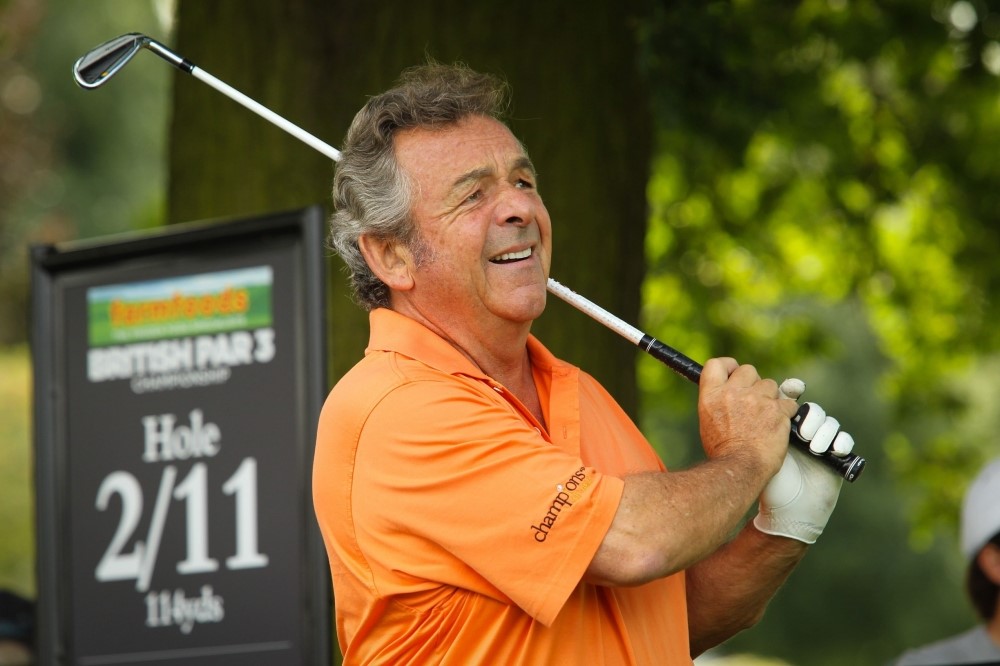Following his milestone 80th birthday. golfing legend Tony Jacklin CBE spoke to Lucy Capaldo, Head of Communications at Champions (UK) plc, organisers of the forthcoming Farmfoods British Par 3 at Warwickshire’s Nailcote Hall which he has hosted for over two decades.
In this captivating interview, he looks back over his career and discussed winning the Open, Ryder Cup captaincy memories and his thoughts (not always positive) on the modern game of golf.
“Timing is everything in life. You realise that as you get older. If the timing is wrong, bad luck. But I think I came along at the right time. Think big and you will grow”
WORLD Golf Hall of Famer Tony Jacklin CBE has reflected on turning 80-years-old and says he feels blessed to have enjoyed such an illustrious career.
Globally renowned for his two major championship victories and Ryder cup captaincy, Jacklin is seen by many as the most talented British player of all time.
Reflecting on hitting his landmark age, he told Champions (UK) plc: “Timing is everything in life. You realise that as you get older. A lot of things you do, that you might think deserve recognition, don’t necessarily always get it. If the timing is wrong, bad luck. But I think I came along at the right time.”
The Englishman’s birthday coincided with the 55th year anniversary of his infamous 1969 Open Championship win. He was born in Scunthorpe, Lincolnshire, and put together an amateur career which compiled a Boys Amateur Championship appearance in Dalmahoy, and a Lincolnshire Open victory in 1961 at just 17-years-old. These local victories gave Jacklin the experience moving into the professional game.
“That’s actually why I was ambitious,” he explained. “I went where I had to go to improve. I went initially down to South Africa in the winter. One of the other things that’s not widely known is that I was the first British player to make a living totally from golf. Some of my contemporaries, Peter Aliss and guys from that era, all had jobs in the winter – they just played golf from sort of April to October on the British circuit.
“I met some incredible people. I got my Tour card in America in 1967, so I was in the deep end by then when I was just 23 years old.
“You suck it up when you’re young like that. I didn’t really have time to think, I was just a lad from Lincolnshire. I wasn’t in awe of anybody particularly because I knew I’d set my goals very high and I wanted to be the best player in the world.
“When I confronted the Nicklaus’ and the Palmers, I knew that I had to beat them somehow, and so that was the mindset. Think big and you will grow.”

Reflecting on the 1969 Open win, a career highlight which Jacklin often discusses as a leading after dinner speaker, he said: “I knew even back then that major championships were what it was all about. It was a great week, a lot of satisfaction in it. I’d immersed myself in the tour in America where all the best players were. And I became one of them.
“That’s really why I was able to handle the pressure involved in winning. I managed to win in America the year before the Open, which was a big factor in being able to handle the pressure as it built through the week. I was young, I was resilient. I was ambitious. Overall, I was a show off.
“That’s really what you are. You’re an actor on the stage, on the biggest stage. It was a great memory and became a great memory for me, it was something I aspired to do from being a kid.”
Jacklin continued: “One of the things I’m proudest of, I’m the only non-American born to have held the British and the US Open championships together. Nobody in the history of the game has done it other than five Americans.
“I only had them together for about a month but nevertheless, I had them together and, that is something that I don’t think a lot of people know.”
Jacklin was made Team Europe’s Ryder Cup captain in 1983. His tenure lasted until 1989, in a hugely successful period for the side in which they won the competition twice and retained it on home soil with a tie.
Reminiscing on this period of his career, he said: “When my Ryder Cup captaincy came around in 1983, my playing days had sort of had the best of them. I’d played in seven Ryder Cups and I’d played in America, I knew the American mindset. I think at the time I was the right guy for the job, but it wasn’t obvious to a lot of people making the rules back in Europe. They took a long while to decide whether they wanted to risk me doing it or not. So I only had six months to prepare.
“I didn’t get any captain’s picks the first time, I had to take it because the system had already got into place by the time they chose me. But we changed some things that I thought needed changing, and we had a great team unity. I was very close to all the players; I’d encourage them to come to me with any questions or anything that they needed. I had a great individual relationship with all of them.
“We nearly succeeded that first time, we only lost by a single point in the Palm Beach Gardens in 1983. I went back after ‘83 and after looking at the things we’d done, I didn’t see anything wrong. I thought it was all positive. It just didn’t happen for us that week.”
Under the captaincy of Jacklin, Europe would go on to overturn this one point loss to the US, emerging victorious in the following two tournaments in 1985-87.
“So we just went into ‘85 with that same mindset and got it done in front of the home crowd,” he continued. “Of course, for the first time on American soil in ‘87. And then we retained it in ‘89 which was also important. But the team had real confidence now, they had real belief that they could beat the Americans.”
Fast forward 35 years, and the landscape of golf has rapidly evolved. Jacklin has viewed and experienced alterations in the sport throughout his lifetime, and he believes that changes need to be made.
When asked whether he enjoys watching golf as much as before, Jacklin replied: “No, I don’t. I think it’s chaotic. We’ve been in a state of chaos for a couple of years. I’m tired of watching guys hit nine irons and wedges into every hole, shooting 62s and 61s from courses that are supposed to be great courses.
“It’s a mess. The technology was never to help pros, it was always to help amateurs, but they took the pros as an example and now all the pros are playing what the amateurs were supposed to.
“In baseball for example, they use wooden bats, the pros. We should still be using a similar wood in my opinion. These fellas, the guys that dedicate their lives to being better, they don’t need the help. But they’ve got it whether they like or not, and of course, on top of that, they’re getting paid an obscene amount. It’s obscene, hundreds of millions of dollars for playing golf, you’re joking!
“So, it’s all a bit out of context and you’ve got to have lived as long as I have to have seen all sides of it. I remember the days of Peter Allis and Christy O’Connor Snr, we’d play an exhibition match on a Sunday on the way home from a tournament for 40 pounds, and thinking we’d had a reasonable day. Now, the caddies make 10 times as much as the pros used to make!
“The last thing I want to appear is sort of resentful, it’s not the players’ fault. I don’t blame them one bit. They they’re all doing things that they do best. Give Tiger another 100 million dollars for doing something and it’ll be fine. Just throw money at everything and the world will be a better place. Marvellous!”
Jacklin was talking ahead of the Farmfoods British Par 3, a 90+ year-old golfing competition at Warwickshire’s Nailcote Hall which he has hosted for over two decades.
Commenting on the event, which takes place from August 6-9, he said: “I always enjoy my week at Nailcote. It’s a gathering of people who love golf, and we’ve been fortunate having Farmfoods as a sponsor for a long time.
“It’s a wonderful experience all together in a historic setting.”
To find out more about the event and how to claim free tickets, visit: https://britishpar3.com/


